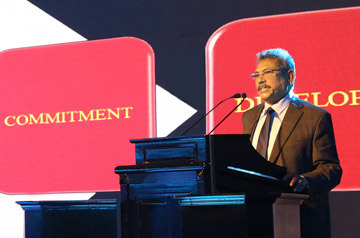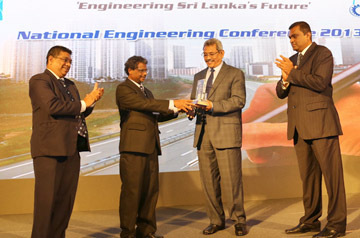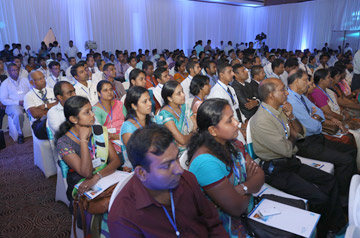|
Role of engineers particularly important:
Collective effort of stakeholders vital for national development
by Gotabaya Rajapaksa
|

Defence Secretary Gotabaya Rajapaksa addresses the National
Engineering Conference |
What is required at this time is for all stakeholders to work
together with vision, dedication and commitment to drive the nation's
development. In this context, the role of engineers assumes particular
importance.
Engineering combines science and mathematics to find solutions to
real world problems, thereby improving the quality of life of countless
people. Engineers from various disciplines play a critical role in
ongoing development initiatives, whether it is in the development of
infrastructure, utilities, industry or services. Their contribution is
essential in the research and development, planning and execution of
most projects.
Engineers also have an important role to play in the formulation of
broader development strategies and even in matters concerning public
policy. As a result of this great responsibility, engineers must work
hard and carry out work of the highest quality so that our society will
benefit.
Furthermore, since engineers are often opinion leaders in their
circles and in many sectors, they also need to contribute to the change
in public attitudes that Sri Lanka needs if it is to become a developed
nation in a short span of time. It is of vital importance that we as a
people develop our mentality to go beyond that of a developing nation,
and to look towards the future with confidence and positive intentions.
Moving out of a “business as usual” approach and adopting new ways of
thinking is essential if we are to progress rapidly. We must start to
think and act as if Sri Lanka has already reached the status it aspires
to. It is only then that we will be able to change established patterns
of behaviour to inspire the development we seek.
In this context, high calibre professionals such as engineers and
professional organisations such as this institution have an important
leadership role to play in our society. Leadership is essential at all
levels and in all sectors of the country.
It should not be expected only from politicians or Government
officials, nor confined to the highest ranks of any organisation.

Defence Secretary Gotabaya Rajapaksa presents an award to a
recipient at the National Engineering Conference |
 |
 |
| A section of
the participants |
During the Humanitarian Operation from 2006 to 2009, our Armed Forces
personnel fought with great bravery and made countless sacrifices to
liberate Sri Lanka from terrorism. They were committed to this cause
because its importance was communicated to them strongly by the entire
leadership, from the President down through the entire chain of command.
This created a cohesive mission that all the Armed Forces personnel were
motivated to accomplish, and as a result, the battle was won.
Positive outlook
Having a positive outlook and taking bold decisions are some of the
key qualities of outstanding leadership. When President Mahinda
Rajapaksa was elected to office in 2005, very few people thought that
the war against terrorism would be won and that peace would come to Sri
Lanka in the foreseeable future. Terrorism had been a part of day-to-day
life in Sri Lanka for so long that there was a widely held perception
that the LTTE could never be defeated. Many people thought that peace
could never be achieved without accommodating the LTTE's demands.
Despite the prevailing negativity, however, the President had a very
clear vision to bring lasting peace to Sri Lanka.
When all options for a peaceful settlement had been exhausted, he had
the foresight, courage and confidence to launch the Humanitarian
Operation. As a result of his bold decision, peace and stability was
restored to Sri Lanka within just three and a half years. This is the
impact that positive thinking and bold decisions can have.
With the dawn of peace, the Government is working hard to develop Sri
Lanka so that it can achieve its full potential. A key part of this
effort is the uplifting of Colombo into a clean, green, people friendly,
world-class city. During this process, there have been a number of
issues that the Government has had to face. These include:
* Flood control
* Solid waste management and disposal
* Providing proper housing for low income, under-served settlements
* Developing parks and more open spaces for public recreation
* Improving the road network and improving pavements for pedestrians
* Enhancing public facilities such as toilets, bus halts and markets
* Restoring old heritage buildings
* Creating walking paths and public areas for people to exercise in and
improve their health.
Uplifting Colombo to a world-class city by solving these issues
requires the input of engineers in various disciplines. Any innovative
and practical solutions that can be proposed for such issues would be
most welcome.
I would like to present some examples to illustrate the past issues
and the ways in which they were addressed. The problem of poor garbage
collection in the streets of Colombo had existed for many years without
any solution being found. In tackling this problem, it was first of all
necessary to clearly understand why it continued to exist in the first
place. When the situation was carefully analysed, it was found that
several private sector companies had been awarded contracts for this
task, but their workers were not performing their jobs properly due to
inadequate supervision.
Once the problem was properly understood, the solution was simple:
the relevant companies were asked to strictly fulfil the terms of their
contracts. Additional oversight was also provided through the setting up
of an Environmental Division within the Sri Lanka Police. With these two
simple measures, the problem of uncollected garbage on the roads was
solved very rapidly.
Garbage disposal
However, Colombo still requires a sound long-term solution for
garbage disposal, and the Ministry of Defence and Urban Development is
presently working on developing a large sanitary landfill in Puttalam.
This is another project that will require considerable input from our
engineers.
Once a problem is identified, it is important that those involved in
resolving it think innovatively and come up with novel solutions. Take
for example the Old Racecourse buildings in Colombo 7. For many years,
this complex had been an eyesore to passersby because it was in very
poor condition and even rather dangerous. As a result, the buildings had
been scheduled for demolition.
However, it was clear that the buildings had a lot of intrinsic
architectural beauty. After much deliberation and reassessment of its
potential, it was decided to rehabilitate the complex and turn it into a
heritage site with restaurant and shopping facilities. After a lot of
work, the Racecourse was restored last year, and is now one of Colombo's
most beautiful attractions. This is a very good example of innovative
thinking and coming up with a bold solution to an existing problem.
It is proper leadership, positive intention and innovation that our
nation needs from its engineers today. Sri Lankan engineers are highly
educated, qualified and skilled.
They have a great deal of experience in complex projects, whether it
is in the design and construction of highways, railways, bridges, power
generation plants or buildings. Our engineers and professionals in
related fields have tremendous capability.
Sri Lankan engineers who work abroad have proven themselves time and
again by reaching great heights in their organisations and by producing
outstanding results. Unfortunately, because of entrenched practices that
have remained unchanged for a long time, many professionals do not
always achieve similar results in Sri Lanka.
To some extent, this is a byproduct of the state of paralysis that
gripped Sri Lanka during terrorism. But now that peace and stability
exist, it is of the utmost importance that we as a society overcome our
prior complacency and strive towards achieving our full potential. For
this to happen, there are several areas that we need to pay particular
attention to.
In any work that is to be undertaken, visualising the nature of the
final product is extremely important. Unfortunately, quite often there
is insufficient visualisation by those who are responsible for
delivering the outcome of the work at hand. This leads to a drop in the
quality of the final product. Take for example, the construction of a
road. For a road to be properly functional, it is not enough to have
adequate space for vehicular traffic.
Design stage
Attention needs to be paid to the pavements so that pedestrians will
be safe and have ample space to walk on. Drainage must also be taken
into account so that the roads do not get flooded after rainstorms. If
the engineers do not visualise the final product properly at the design
stage, sometimes these key design considerations can get overlooked. As
a result, the final product simply will not live up to the required
standard.
What is most important in this regard is going into detail. Every
single aspect of the final product or outcome needs to be examined well
in advance, so that the highest possible quality can be obtained.
To return to the example of roads: It is very noticeable in Sri Lanka
that various agencies dig up the roads from time to time when they need
to improve existing facilities or implement new projects. This sort of
repeated work on the same road is not only a heavy burden on the
taxpayers, but it also unnecessarily impedes the flow of traffic and
degrades the quality of the road.
If the engineers responsible for planning the road initially had
taken the extra step of coordinating with other agencies, and
anticipating other future requirements by designing a common conduit for
services alongside the road, this could have been avoided.
This was precisely the approach adopted under the Metro Colombo Urban
Development Project when improvements were made to several major streets
in Colombo, including Vauxhall Street, Union Place, Darley Road,
Chittampalam A. Gardiner Mawatha and Kumaran Rutnam Road. All relevant
institutions and agencies were requested to indicate their future
requirements for these roads, which were then incorporated into the
project.
These included the laying of water pipes under the National Water
Supply and Drainage Board's Water Supply Services Improvement Project,
and the laying of underground electricity cables of the Ceylon
Electricity Board. Further ducting facilities were provided for future
expansions to other services.
This is an example of a simple measure taken to improve the long-term
quality of our roads. This is a methodology that engineers in the Road
Development Authority and Municipal and Urban Councils should advocate
for and incorporate to their future road developments.
Just as much as going into detail is important during the design
stage, engineers and project managers must also ensure that everyone
involved in the construction, from the contractor to the supervisors and
ultimately the workers, are fully aware of what needs to be done.
Obtaining their commitment is essential. They must be made to understand
the importance of the work at hand so that they approach it with
motivation.
Desired result
If they are unmotivated, the workers will not work hard to achieve
the desired result. Instead, they will only do the bare minimum. This
can have negative consequences on the final outcome.
Therefore, it is important for the relevant professionals to clearly
communicate to their subordinates specific objectives and goals to
achieve, and inspire them to work hard through their own example.
The provision of proper supervision during construction is very
important in this regard. Unless the engineers get involved and
frequently monitor the progress of the work, mistakes will be made.
Sometimes, however, this supervision is simply not there or is
inadequate. That can lead to disastrous consequences.
Higher officials and supervisors are sometimes reluctant to visit
poorly maintained and unsafe construction sites. However, if they do not
visit sites and supervise from time to time, the work most likely will
not get done properly. Once the construction is completed, it is too
late to change anything without incurring major costs or major delays.
As such, it is very important to ensure that sites are properly
maintained so that supervision can take place with the necessary
frequency. At the same time, it is not enough for supervisors to just
glance at the work being done.
They must go into detail. Close observation is essential, and the
progress of work needs to be frequently evaluated against the desired
final outcome. This is true in virtually every single field.
By adopting these simple measures and by developing the very
essential qualities of leadership, positive thinking, careful analysis,
innovation and going into detail, it will be possible for us to achieve
great things.
There are numerous fields in which we need our engineers to step
forward and come up with innovative solutions to existing problems.
After all, engineers are the ones most familiar with developing
technological trends in the world at large. You need to evaluate current
advances and apply them to solve our existing problems.
The solution to the problem of traffic is not the construction of new
roads or the widening of existing ones, but the use of innovative
techniques of transport engineering.
The solution to the power crisis is not only in the construction of
new power generation facilities, but also in the improvement of
transmission and utilisation efficiency. Adopting new alternative energy
sources is also important.
We need engineers to get involved and devise new solutions for
building functional, attractive, yet low cost public housing for
under-served settlements.
Innovative methods
We need engineers to come up with innovative methods to help mitigate
problems such as water, land and air pollution. Even with regard to
public security, it is very clear that traditional policing methods are
no longer adequate to deal with the increasing sophistication of
criminals and terrorists.
We need engineers to get involved in these areas too, so that we may
apply advances in modern technology to create a safer social and
community environment. There are so many opportunities for engineers and
those in allied professions to truly make a difference to Sri Lanka
today.
Unfortunately, one of the problems we face as a nation is that many
of our talented professionals leave the country in pursuit of higher
paying jobs abroad. However, it is important to remember that though it
is possible to earn more in certain other nations than in Sri Lanka, you
will also spend much more than you do in Sri Lanka; you will effectively
be a second-class citizen; you will lose touch with your close relatives
and your friends; you will lose touch with your roots.
Young professionals in particular must realise that as Sri Lanka
develops, there will be many more opportunities for them to excel and
succeed here. Whether employed in the Government sector or the private
sector, professionals’ prospects today are much better than they have
been in the last many decades.
Sri Lanka is a country at peace and it is enjoying the benefits of
its stability. It is developing rapidly. A great deal of work is being
done to improve the country's infrastructure and the quality of its
urban spaces. More and more facilities are being created for young
people and families to enjoy. The environment here will soon be on par
with those of more developed nations. Creating this change is partly in
your hands.
The task ahead of us in terms of economic development is one that
requires a collective effort from all Sri Lankans, and in particular our
professionals. We must make maximum use of the opportunity afforded by
our present peace and stability to achieve future prosperity.
As engineers, all of you have a critical role to play in this regard.
You must provide the impetus necessary for our national transformation
through the valuable work you do in your various disciplines and your
various capacities. You must be creative and innovative. You must lead
the charge in overcoming the Third World mentality and inculcating a
fresh perspective on our future. If you all take this mission to heart
and commit yourselves to the task of improving our nation, I have every
confidence that you will help engineer a better future for Sri Lanka.
Excerpts of the speech delivered by Defence Secretary Gotabaya
Rajapaksa at the National Engineering Conference at Galadari Hotel,
Colombo last Thursday. |

